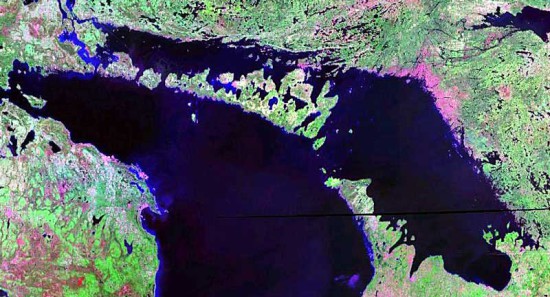MANITOULIN—An adaptive management plan skirts the low water issue in the Great Lakes including Lake Huron, says a local resident.
“You don’t fix one problem by looking at another,” stated Mike Wilton, a Spring Bay resident and a representative on the water committee of the Manitoulin Area Stewardship Committee (MASC) in relation to an International Joint Commission (IJC) announcement of an adaptive management plan for extreme Great Lakes Water levels.
“It made my blood boil when I saw what they are proposing,” stated Mr. Wilton. “This new committee is being set up that I’m sure will cost us millions of dollars, looking at what happens to water levels because of global warming. But we have a problem with lake levels now, and this should be addressed first.”
“I think this is just a red herring,” said Mr. Wilton. “How much can the governments spend before they will actually do anything on the issue of low water levels? Who can forecast global warming levels accurately in the future…meanwhile we have a low water problem now and the problems concentrate on Chicago and Sarnia, but the IJC appears to just be pushing this aside.”
“We need to get our house cleaning done first before we clear our neighbour’s house,” stated Mr. Wilton. “We are seeing water levels that are way more than five feet down from where they were, and the IJC knows where the problem arises but aren’t doing anything about it. Now they are going to initiate a new committee to look at global warming, not fix the problems we have staring us in the face.”
The International Great Lakes-St. Lawrence River Task Team has a mandate to develop a detailed Adaptive Management Plan that will evaluate and prioritize adaptive management activities in the Great Lakes-St. Lawrence River basin to address future extreme water levels, the IJC website notes.
The task team will develop a basin-wide plan to identify and provide details of adaptive management activities required for the upper Great Lakes system, the Lake Ontario-St. Lawrence River system, and activities that are common to both.
The IJC site notes that although the future is not certain, increases in temperatures and changes in precipitation patterns are likely to affect water levels in the Great Lakes-St. Lawrence River system. There is strong evidence that in the future we will experience extreme water levels, both high and low, that are outside the historical range. Indeed, record low water levels were experienced in January 2013 on Lakes Michigan and Huron.
Recent lake levels studies suggest that the best way to address the potential for extreme water levels and the uncertainties, including those associated with climate change, is through adaptive management.
A draft Adaptive Management Plan for the Great Lakes St. Lawrence River System has been released for public review. The plan aims to provide a more efficient and cost-effective way to monitor climate trends and support decision making aimed at reducing the impact to communities, the economy and the environment from extreme water levels.
“On May 29, 2012 the IJC issued a directive to establish the International Great Lakes-St. Lawrence River Adaptive Management Task Team and directed it to develop a detailed Adaptive Management Plan to address future extreme water levels in the Great Lakes-St. Lawrence River system,” the IJC website notes. “On March 15, 2013, the bi-national Adaptive Management Task Team released its proposed Adaptive Management Plan, ‘Building Collaboration Across the Great Lakes-St. Lawrence River System: An Adaptive Management Plan for Addressing Extreme Water Levels.’ The proposed Adaptive Management provides a new approach to addressing water level issues, one that is based on working collaboratively with partners in the Great Lakes-St. Lawrence River system to gather and share critical information over time, assess the information with state of the art tools, develop adaptation strategies, measure our collective success in managing the impacts of extreme water levels and adapt accordingly. Its goal is to provide a more efficient and cost effective way to support decision-making aimed at reducing the impacts associated with future extreme water levels.”
The adaptive management task team is seeking input from the public on the draft plan between March 15 and April 15, 2013. In particular, the task team would like feedback on the following: do you support the general adaptive management approach for addressing future extreme water levels? How could the proposed Adaptive Management plan be improved? What concerns do you have about the proposed Adaptive Management Plan?
Comments on this draft plan will be invited from March 15-April l5. The International Great Lakes-St. Lawrence River Adaptive Management Task Team will consider comments received before making final recommendations to the International Joint Commission in May 2013.
The Adaptive Management Task Team will be hosting a series of webinars to provide more information on different aspects of the draft adaptive management plan. These will take place on March 19, 21, 26, 28, April 2, April 4 and include the aspects of looking at hydro climate monitoring and modeling, performance indicators and risk assessment, plan valuation and decision tools, information management and distribution, governance for adaptive management, outreach and engagement, adaptive management pilot projects, and land adaptive management pilot projects. The draft Adaptive Management Plan and more information about the public review process is posted online at ay, March 15 at http://ijc/org/boards/stlawrencerivertask team/.





